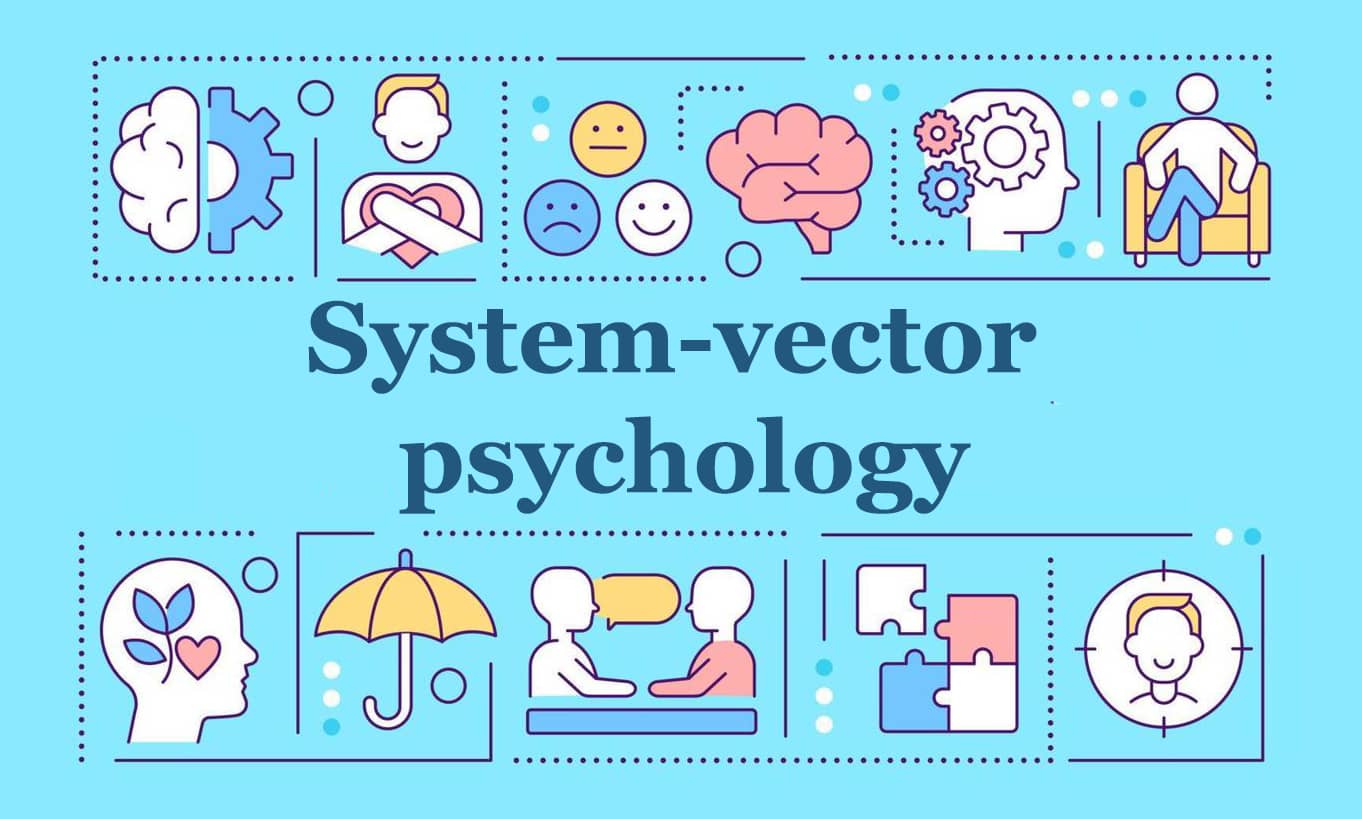System-Vector Psychology (SVP) is a modern approach to understanding human psyche and behavior, offering a unique perspective on personality structure based on the idea that each person possesses a certain set of psychological characteristics called “vectors.”
System-vector psychology is a psychological concept developed by Russian psychologist Yuri Burlan in the early 2000s. According to this theory, the human psyche consists of a system of eight vectors, each corresponding to a specific set of psychological traits, abilities, and needs. SVP claims that understanding these vectors and their interactions allows for a more precise analysis of personality, prediction of behavior, and solution of psychological issues.
The origins of system-vector psychology can be traced back to the work of Sigmund Freud and his followers, especially Wilhelm Reich’s character theory. However, Yuri Burlan significantly developed and transformed these ideas, creating his own comprehensive system.
The development of SVP began in the 1980s when Burlan started researching connections between people’s psychological characteristics and physiology. By the early 2000s, the theory took its current form, and Burlan began actively conducting seminars and training sessions on system-vector psychology.
Since then, system-vector psychology has gained popularity, especially in Russia and CIS countries. Despite not receiving widespread recognition in academic circles, it has found numerous followers among practicing psychologists and people interested in psychology and self-development.

System-Vector Psychology: Key Concepts
The human psyche is a complex, multifaceted system that psychologists have tried to decipher and explain for centuries. System-vector psychology offers a unique approach to this challenge, viewing personality through the prism of eight fundamental vectors, each associated with a specific erogenous zone and a set of psychological traits.
While rooted in the psychoanalytic tradition, this theory goes further, offering a more structured and systematic view of personality formation and functioning. It posits that each person has a unique combination of these vectors, explaining individual differences in behavior, thinking, and emotional reactions.
Understanding the basic concepts of system-vector psychology opens new horizons in self-awareness and interpersonal interaction. It allows us to see the hidden motives behind behavior, explain apparent contradictions in character, and find pathways for harmonious personality development.
To get a clearer picture of system-vector psychology, one needs to delve into the key concepts on which it is based. The primary ones are the concepts of “vector” and “systematization.”
The Concept of “Vector” in Psychology
In system-vector psychology, the term “vector” is used metaphorically and denotes a certain set of psychological traits associated with a specific erogenous zone (in the psychoanalytic sense). Each vector includes:
- Specific psychological characteristics.
- Distinct abilities and talents.
- Unique desires and aspirations.
- Typical behavioral patterns.
- A predisposition to certain types of activities.
It is important to note that in SVP, a vector is not viewed as an isolated trait but as part of an integral system of the human psyche. Each of us possesses all eight vectors, but they are developed to varying degrees, which determines the uniqueness of personality.
The Eight Vectors by Yuri Burlan
System-vector psychology identifies the following eight vectors:
- Anal Vector
- Urethral Vector
- Muscular Vector
- Skin Vector
- Oral Vector
- Visual Vector
- Sound Vector
- Olfactory Vector
Each of these vectors is associated with a specific erogenous zone and has unique characteristics, which I will detail in the following sections.
The Concept of Systematization in Psychology
Systematization in the context of SVP implies that all eight vectors are interconnected and interact with each other, forming a unified system of the human psyche. This entails:
- Wholeness: A change in one vector affects the entire system.
- Hierarchy: Vectors can be more or less pronounced, creating a hierarchy within the personality structure.
- Interdependence: Vectors can amplify or diminish each other’s manifestations.
- Dynamism: The system of vectors can change over time under various influences.
Understanding systematization in SVP allows for a deeper analysis of personality and behavior, taking into account the complex interconnections between various aspects of the psyche. These fundamental concepts form the foundation of system-vector psychology and are key to understanding its principles and methods.

The Eight Vectors
Imagine an artist’s palette, where each color represents a distinct aspect of human nature. Now, imagine that this palette consists of eight main colors that, when mixed in different proportions, create an endless variety of human characters. This is the picture that system-vector psychology paints, offering eight basic vectors as the foundation for understanding personality.
These vectors do not exist in isolation; they constantly interact, enhancing or diminishing each other, creating a unique psychological profile for each individual. Just as a musician creates a melody by combining various notes, nature creates a personality by combining different vectors.
Studying these eight vectors is a journey into the depths of human nature, revealing an astonishing diversity of talents, desires, and needs. It allows us not only to better understand ourselves and others but also to see the potential for personal growth and development hidden within each of us.
Anal Vector
The anal vector is considered one of the fundamental vectors in system-vector psychology. People with a pronounced anal vector possess the following traits:
- An inclination for order and systematization.
- High levels of responsibility and reliability.
- A desire for stability and conservatism.
- Good memory for details.
- A tendency toward accumulation (both material and intellectual).
- Pedantry and perfectionism.
Professional fulfillment for the anal vector often occurs in fields requiring attention to detail, systematization, and analytical skills: accounting, programming, scientific research, archiving.
Urethral Vector
The urethral vector is considered one of the rarest and is associated with leadership qualities. Key characteristics:
- Natural leadership abilities.
- A drive for freedom and independence.
- A propensity for risk-taking and adventure.
- Charisma and the ability to lead people.
- Strategic thinking.
- Intolerance for restrictions.
People with a pronounced urethral vector often become leaders, politicians, entrepreneurs, or leaders of social movements.
Muscular Vector
The muscular vector is associated with physical activity and practical skills. Characteristics:
- High physical endurance and strength.
- Practicality and concrete thinking.
- A tendency for teamwork.
- A focus on material values.
- Good tactile sensations.
- A preference for routine work.
Professional fulfillment often occurs in fields related to physical labor, sports, construction, and agriculture.
Skin Vector
The skin vector is associated with flexibility, adaptability, and a drive for efficiency. Key traits:
- High adaptability to changes.
- A desire to conserve resources and time.
- An ability to find the shortest paths to problem-solving.
- A tendency for planning and calculations.
- A good sense of time and space.
- A craving for new experiences and sensations.
People with a pronounced skin vector are often successful in business, logistics, design, and professions requiring quick responses and multitasking skills.
Oral Vector
The oral vector is associated with communication skills and speech. Characteristics:
- Well-developed verbal abilities.
- Sociability and eloquence.
- Emotionality and expressiveness.
- A tendency to exaggerate.
- A love for food and taste sensations.
- The ability to persuade and influence others.
Professional fulfillment often occurs in fields related to communication: journalism, PR, sales, teaching, psychology.
Visual Vector
The visual vector is associated with emotional sensitivity and creative abilities. Key traits:
- High emotional receptivity.
- Developed imagination and creativity.
- A tendency for empathy and compassion.
- An interest in art and aesthetics.
- Idealism and striving for perfection.
- A tendency for introspection and self-reflection.
People with a pronounced visual vector often thrive in creative professions: artists, designers, directors, and in areas requiring emotional intelligence, such as psychotherapy.
Sound Vector
The sound vector is considered one of the most intellectual and abstract. Characteristics:
- A propensity for abstract thinking and philosophizing.
- An interest in the meaning of life and existential questions.
- Developed analytical skills.
- Musicality and a sense of rhythm.
- Introversion and a preference for solitude.
- The ability for deep concentration.
Professional fulfillment often occurs in science, philosophy, music, IT, and other areas requiring deep analysis and abstract thinking.
Olfactory Vector
The olfactory vector is considered one of the most complex and contradictory in system-vector psychology. Key traits:
- A keen sense of justice.
- A tendency toward sharp judgments and criticism.
- An intuitive understanding of people and situations.
- An ability to detect hidden motives and deception.
- An interest in topics of life and death, religion.
- A tendency toward depressive states.
People with a pronounced olfactory vector may find fulfillment in fields related to investigation, criminology, psychology, religion, as well as in criticism and analysis.
Understanding these eight vectors and their interactions allows system-vector psychology to create a comprehensive personality portrait, explaining a person’s behavioral characteristics, motivations, and abilities.

Methodology of System-Vector Psychology
In psychology, methodology is not merely a set of tools; it is the key to understanding the human psyche. System-vector psychology offers a unique key, unlocking the profound aspects of personality. This methodology combines elements of classical psychoanalysis, modern psychometric approaches, and systems thinking.
Like an archaeologist who recreates the story of an ancient civilization piece by piece, a specialist in system-vector psychology gathers and analyzes numerous details to build a comprehensive portrait of personality. Every gesture, word, and reaction can serve as a crucial hint, pointing to dominant vectors and their interactions.
This methodology goes beyond simple categorization by types. It seeks to uncover the dynamic nature of personality, revealing how different vectors manifest in various life situations and how they may evolve and transform over time. Thus, system-vector psychology is both a diagnostic and therapeutic tool, opening paths for personal growth and development.
Vector Diagnostics
Vector diagnostics is a foundational step in working with system-vector psychology and involves:
- Questionnaires. Specially designed surveys help determine the intensity of each of the eight vectors in an individual.
- Observation. System-vector psychology specialists are trained to notice characteristic manifestations of vectors in a person’s behavior, speech, and even appearance.
- Interviews. In-depth interviews uncover hidden motives, values, and behavioral patterns associated with different vectors.
- Biography Analysis. Reviewing a person’s life path can provide valuable clues about dominant vectors and their influence on life choices.
- Psychological Testing. Additional psychometric tools can be used to confirm and refine the results of vector diagnostics.
It is essential to note that vector diagnostics require specialized training and experience, so they are typically conducted by certified system-vector psychology specialists.
Analysis of Vector Combinations
After determining the intensity of each vector, a system-vector psychology specialist analyzes their combinations. This stage includes:
- Identifying Dominant Vectors. Determining the two or three most prominent vectors that exert the most influence on the personality.
- Analyzing Vector Interactions. Exploring how different vectors reinforce or weaken each other’s manifestations.
- Detecting Vector Conflicts. Identifying contradictions between the needs and aspirations of various vectors that may lead to internal conflicts.
- Evaluating Vector Balance. Analyzing the overall harmony of the vector structure of the personality.
This comprehensive analysis allows for the creation of a psychological profile that explains a person’s behavior, motivation, and potential paths for development.
Application in Psychological Practice
System-vector psychology is used in various areas of psychological practice:
- Psychological Counseling. System-vector psychology helps quickly identify the root of a client’s problems and offer effective strategies for resolving them.
- Psychotherapy. Understanding the vector structure of personality allows for an individualized therapeutic approach that considers the client’s unique characteristics.
- Coaching. System-vector psychology is employed to identify personal strengths and potential areas for growth.
- Career Guidance. Vector analysis helps determine the most suitable fields for professional fulfillment.
- Family Counseling. System-vector psychology helps to better understand relationship dynamics in couples or families, based on the vector characteristics of each family member.
- Organizational Psychology. Applying system-vector psychology in business optimizes teamwork and improves personnel management.

Practical Application of System-Vector Psychology
Theory without practice is like a ship without the sea—it may be well-constructed but will never fulfill its purpose. System-vector psychology finds its true expression in practical application, where abstract concepts transform into real tools for changing people’s lives.
From the psychotherapist’s office to the corporate office, from the family living room to the classroom—system-vector psychology permeates all areas of human life, offering a new perspective on age-old problems. It becomes a compass, helping people navigate the complex world of interpersonal relationships and professional development.
The practical application of system-vector psychology goes beyond using ready-made solutions. It’s an art of adapting theoretical knowledge to the unique circumstances of each person or group, requiring a deep understanding of theory, a keen sense of context, empathy, and a creative approach.
In Personal Development
System-vector psychology provides powerful tools for self-awareness and personal growth:
- Self-Analysis. Understanding one’s vector structure helps identify strengths and limitations.
- Working on Weaknesses. Knowing their vector characteristics enables a person to purposefully develop missing qualities.
- Stress Management. System-vector psychology helps to understand individual stress triggers and develop personalized coping strategies.
- Increasing Self-Esteem. Awareness of the uniqueness of one’s vector combination promotes self-acceptance and self-esteem.
- Goal-Setting. Understanding one’s vector characteristics helps set realistic and achievable goals aligned with natural inclinations.
In Interpersonal Relationships
System-vector psychology offers a new perspective on building and improving relationships:
- Improving Communication. Understanding the vector characteristics of the interlocutor helps choose the most effective communication style.
- Conflict Resolution. System-vector psychology identifies the root of conflicts associated with vector structure differences, allowing for compromise solutions.
- Team Building. In a work environment, knowledge of employees’ vector characteristics helps create effective teams with complementary skills.
- Enhancing Romantic Relationships. System-vector psychology helps partners better understand each other and find ways to interact harmoniously.
- Parenting. Understanding a child’s vector characteristics allows parents to choose the most suitable parenting style.
In Career Guidance and Counseling
System-vector psychology provides valuable insights for career choice and development:
- Career Choice. Analysis of vector structure helps determine fields where one can realize their full potential.
- Career Planning. System-vector psychology allows for creating a career trajectory considering one’s natural talents and inclinations.
- Adaptation in the Workplace. Understanding one’s vector characteristics aids in adapting quickly to a new work environment and team.
- Professional Skill Development. System-vector psychology helps prioritize skills for successful career advancement.
- Burnout Prevention. Awareness of vector characteristics helps prevent burnout and find ways to restore energy.
In Psychotherapy
System-vector psychology offers a new approach to therapeutic practice:
- Diagnostics. System-vector psychology allows for quickly creating a psychological profile and identifying the root of client issues.
- Individual Approach. Knowing the client’s vector structure enables the therapist to choose the most effective methods of working with them.
- Working with Trauma. System-vector psychology helps understand how traumatic experiences affect different vectors and develop healing strategies.
- Behavioral Correction. Understanding vector characteristics allows for effective strategies to change unwanted behavior patterns.
- Group Therapy. System-vector psychology can be used to form therapeutic groups and improve group dynamics.
The practical application of system-vector psychology demonstrates its potential as a versatile tool for understanding human psyche and behavior. However, like any psychological theory, it requires critical thinking and further research to confirm its effectiveness in various contexts.

Critique of System-Vector Psychology and Scientific Discussions
No significant theory in the history of science has escaped criticism and debate. System-vector psychology is no exception. Like a new species in the ecosystem of scientific ideas, it provokes both interest and admiration, as well as skepticism and resistance.
Critique and discussions around system-vector psychology are not merely academic exercises. This essential process helps the theory grow, improve, and find its place in the complex landscape of modern psychology. It challenges proponents of the theory to seek more convincing evidence, develop more precise methods, and consider the limits of their approach.
At the same time, these debates reflect broader questions in psychology and science in general. They address fundamental issues about the nature of scientific knowledge, the relationship between theory and practice, and the cultural universality of psychological concepts. In this way, discussions surrounding system-vector psychology become a microcosm reflecting current trends and issues in the modern science of human behavior.
Scientific Validity of the Theory
One of the main points of critique for system-vector psychology is its scientific validity:
- Lack of Empirical Research. Critics point to a lack of large-scale, peer-reviewed studies confirming the main principles of the theory.
- Falsifiability Problem. Some scholars note that system-vector psychology is formulated in such a way that it is challenging to disprove, which contradicts the falsifiability principle important for scientific theories.
- Lack of Standardized Assessment Methods. Critics point to the lack of generally accepted, validated tools for vector diagnostics.
- Subjectivity of Interpretations. Some specialists believe interpretations in system-vector psychology are too subjective and rely heavily on a practitioner’s personal experience and opinion.
Ethical Issues
The application of system-vector psychology raises several ethical concerns:
- Risk of Stereotyping. There is a danger that people may be “boxed in” by their vectors, which could limit their potential for development.
- Confidentiality. Using system-vector psychology in organizational settings raises questions about the confidentiality of employee information.
- Practitioner Qualification. Critics highlight the lack of a standardized training and certification system for system-vector psychology practitioners, which could lead to incompetent application of the theory.
Comparison with Other Psychological Approaches
An important aspect of discussions surrounding system-vector psychology is its comparison with other psychological theories and approaches:
- Relationship with Psychoanalysis. Many view system-vector psychology as a development of psychoanalytic ideas; however, critics note insufficient theoretical continuity.
- Comparison with the Big Five Personality Theory. Some researchers attempt to find correlations between system-vector psychology vectors and Big Five personality traits, but the results remain inconclusive.
- Integration with Cognitive Behavioral Therapy. Discussions are ongoing about the possibility of integrating system-vector psychology with CBT methods to improve psychological assistance.
Cultural Specificity
A separate point of discussion is the question of the cultural universality of the theory:
- Eurocentrism. Some critics argue that the theory is too oriented toward European culture and may not account for the specific features of other cultural contexts.
- Applicability in different cultures. Discussions are underway on the extent to which the concepts of System-Vector Psychology (SVP) apply in non-Western cultures and whether they require adaptation.
Prospects for Development
Despite criticism, proponents of System-Vector Psychology see potential for its growth:
- Conducting scientific research. Plans are in place for more rigorous scientific studies to verify the theory’s basic premises.
- Development of standardized methodologies. Work is underway to create and validate standardized tools for vector diagnostics.
- Integration with other approaches. Researchers are exploring the possibility of integrating SVP with other psychological theories and practices to create a more comprehensive approach to understanding personality.

Conclusion
System-Vector Psychology represents an exciting journey into the depths of the human psyche. It offers a unique perspective on personality structure, illustrating the complex interaction of eight psychological vectors. This theory not only provides new tools for understanding oneself and others but also opens new horizons in applied psychology, from personal development to organizational consulting.
However, like any groundbreaking idea, System-Vector Psychology faces criticism and skepticism. Questions about its scientific validity, methodological rigor, and cultural universality remain hotly debated within the professional community. These discussions do not diminish the significance of the theory; rather, they encourage its development and improvement.
The future of System-Vector Psychology largely depends on its ability to integrate into the existing scientific paradigm and provide convincing empirical evidence for its propositions. Promising directions for development include large-scale scientific studies, the development of standardized diagnostic methods, the exploration of cross-cultural aspects, and integration with other psychological approaches.
Regardless of where System-Vector Psychology ultimately finds its place in the future of psychological science, it has already contributed significantly to the discussion of fundamental questions about the nature of human personality. It prompts us to re-evaluate individual differences, rethink our approaches to personal development, and redefine our interpersonal relationships.
In a world where understanding human nature is increasingly important for solving global problems, theories like System-Vector Psychology play a crucial role. They not only broaden our understanding of ourselves and others but also offer new ways toward more harmonious and conscious living. Continuing research and discussions in this field promise to bring many interesting discoveries and ideas that could reshape our perspective on the human psyche and behavior.




